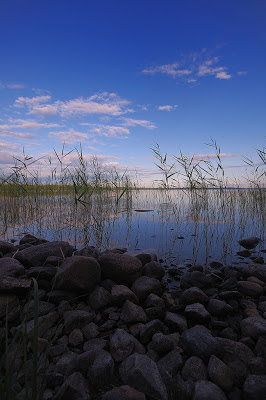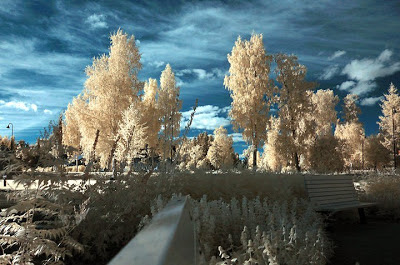That was easy, wasn't it? Well, not quite. Perhaps a somewhat longer and more accurate answer would be: "Not as many as you think". Whether that would be a non-zero number, is up to many things. Let's take a step back and make a short list with the most common filters used for photography.
- UV filter
- Polarizer
- ND
- Graduated ND
- Infra Red
1. UV Filter
The most useless and needless filter of them all! Did you read my article on the 10 mistakes we have all made? Well, take a look at #3 there. A UV filter does nothing else except reducing image quality. Why would you want to reduce the image quality of your photographs?
What did you say, lens protection? Well, consider this. How many $1000+ lenses do you have? And how often do you take them to, say, the beach? If you really do, and if you're really fretting over it, you could perhaps get a good-quality multi-coated UV filter. But otherwise, it's a total waste.
 |
| Polarizers can offer very beautiful colors |
2. Polarizer
This is actually a pretty decent type of filter. It increases saturation, reduces reflections, and so allows the camera to "see" through e.g. water surface. But consider some things:
a) the amount of reflection reduction depends on the angle. In certain conditions/angles, you simply cannot use this filter.
b) as you turn the camera orientation, or as you focus (with lenses whose front element rotates), the polarizer angle changes.
c) taking the above two points into consideration, each shot requires planning. To put it this way, this is not the kind of filter you can usually have and use when you shoot fast action, or shots that can't be planned in advanced.
d) did you know it reduces the amount of light it goes through it? You lose one to one-and-a-half stop.
3. ND
Stand for Neutral Density. This is a darkening filter. Think of it as sunglasses for your lens. It comes in various strengths (ND2, ND4, ND8...). The larger the number, the darker the filter. This is a filter that can be useful in certain specific shots. The most common application is if you want shots of water flows during daylight, because you want a smooth, silky water motion. By using an ND filter, you can have an exposure of several seconds, otherwise impossible in daylights conditions.
 |
| Graduated ND (side-)effect. The sky is darkened, but so is the top of the building. |
4. Graduated ND
Like the one above, but only half of it is dark. It has only one purpose, really. To reduce the brightness of the sky in a landscape shot. Good idea, but in its implementation it's usually pretty complicated. You see, the scene has to be completely devoid of any elements that reach to the sky part of the frame. Otherwise, a tree or a building is suddenly darker on its top half - a very unnatural effect.
5. Infra Red
A very popular filter, usually by beginners who are enamored with infrared photos. They are beautiful, to be sure, but they get old quickly. And the whole complexity of the infra red procedure just makes it not very worthy in the end. If you really, really are into this kind of photography, getting a specialized camera (a camera whose IR blocking filter has been removed and a custom IR filter has been fitted) is a much better option. Otherwise, prepare yourself for quite much frustration.
 |
| Infra-Red images can be captivating, but they require plenty of work |
Conclusion
I'm a professional photographer, and do you know how many filters I use? None! That's a bit misleading of course - it's just that I don't need any for my kind of work. Perhaps you need for yours. I can imagine landscape and macro photographers have use for polarizers and NDs. But if you just want to take some photos - of all kinds - you don't really need any filter. You just need imagination and a creative eye. In order of importance/usefulness?
- Polarizer
- ND
- Infrared
- Grad ND
- UV
And I would throw the last two in the dumpster, actually!

No comments:
Post a Comment